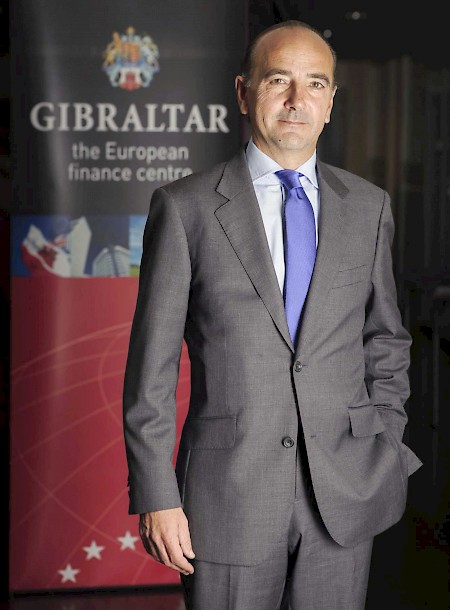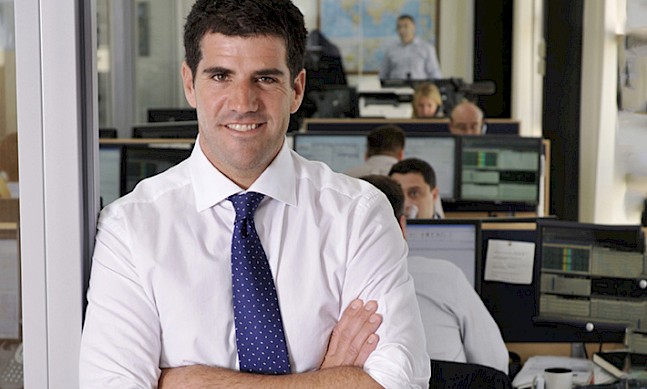
After 14 years in international investment banking in London, New York and Sao Paulo, in 1999 James Tipping took the reins at Gibraltar Finance, a government-run initiative which promotes Gibraltar as the EU domicile of choice for financial services, from funds to insurance, pensions and banking. He spoke to The Report Company about the organisation’s new, expanded focus on raising awareness about what Gibraltar has to offer.
The Report Company: How concerned are you about the potential of a UK exit from the EU and the impact that this could have on Gibraltar’s financial services industry?
James Tipping: Whilst Gibraltar and the United Kingdom are two separate legal jurisdictions; national interests, in financial services in particular, do coincide. The City of London, which is one of the world’s most important financial capitals, is clearly a huge lobby group. Whatever is in the City of London’s financial interests also coincides with our national interests. Little Gibraltar’s financial services sector isn’t really in the position to be able to lobby particularly hard as a commercial lobby group, but the City is. It will be in the City’s interest to ensure that their primary position in terms of financial services certainly within Europe is maintained in the unlikely event of the referendum outcome being a so-called Brexit.
From a very pragmatic, commercial point of view, I would say that the financial services sector in Gibraltar will enjoy whatever scenario the City of London enjoys in the unlikely event of a Brexit. Those national interests will ensure that we are not in a particularly negative position.
TRC: You said three years ago that your objective was to see a significant difference in terms of Gibraltar Finance’s profile, presence and new business achievements and development in the financial services sector. How has this played out?
JT: The current government decided to invest significantly in terms of resource and budget in the finance division, which has been rebranded now as Gibraltar Finance.
A very significant number of new hires have been made in the core areas that we are looking to develop, i.e. insurance and its different subsets which are captive insurance, general insurance such as motor which continues to power ahead, and insurance-linked securities, which are a new area of business for Gibraltar with our first ILS transaction a couple of months ago. There is also QROPS for pensions, and then the traditional private client sector, whether that be traditional banking or the use of trust structures or company vehicles for investment holdings. Finally, there is fund and asset management.
We have set out our stall in respect to insurance-linked securities. We have set up a team to work on that, coordinated by one of the senior executives here, and coincidentally George Osborne in a recent budget had indicated that he wanted London to be a centre for insurance-linked securities, so I appreciate that we are on the same page.
The three key hires were very important. These are very senior people with 30 years’ experience in their areas of financial services. We have also hired more individuals to work on logistics and marketing, and the marketing budget has been increased quite significantly.
A business plan was rolled out in terms of what we want to achieve and what key markets we want to concentrate on.
“From a very pragmatic, commercial point of view, I would say that the financial services sector in Gibraltar will enjoy whatever scenario the City of London enjoys in the unlikely event of a Brexit”Tweet This
TRC: Which markets are you focussing on?
JT: Our core traditional markets have been the United Kingdom and Switzerland. We share very common values with the UK in terms of financial services. Switzerland is because of the links with the independent asset management business, which is different to the funds business out of London. Out of London, it tends to be much more institutional, while out of Switzerland the business is much more private wealth management.
We have expanded beyond that now, and we have identified a number of key countries outside of core markets. Those are New York, for the purposes of insurance linked securities; Bermuda, to offer businesses and people using Bermuda as a global insurance hub an EU perspective; and Hong Kong, where the government has opened an office. We have a dedicated resource there that spends about 50 percent of his time working on assisting us with financial services. The last one is South Africa for funds and insurance. There is a small but still significant number of South African-owned insurance companies in Gibraltar, and we are trying to leverage on that.
All of these places have something in common. The first is that they all have a very strong regulatory regime. The second is that they all have decades upon decades of experience in financial services. Third, they all have a very strong legal system, and some of those, certainly Bermuda and Hong Kong, are based on English common law; in South Africa, it’s English procedural law but also mixed in with a bit of civil law. These common themes allow penetration of markets quite quickly, and the comfort level can be achieved very quickly. Conversely, when we explain to people in Bermuda what we are, because we are a sister overseas territory, they can identify with us very quickly, and constitutionally we have the same constitutional relationship with the UK as Bermuda. Even places like Hong Kong, for the sake of argument, find it very easy to understand conceptually what we are, because they understand the concept of the British overseas territories as financial centres. Then all we have to do is add on the differentiating factor between us and some of our other sister overseas territories, which is the fact that we are in the EU single market.
I think there is an element of common sense in approach to why we have identified those particular countries outside of our key markets. We also have to bear in mind that no matter how much resource you employ or how much marketing budget you increase, there’s always a limit to how much you can do.
We have hired a PR firm in London that we use in terms of trying to leverage the amount of information about Gibraltar.
TRC: Why has the decision been made to increase Gibraltar Finance’s budget now?
JT: For quite some time, the industry in Gibraltar has been asking for a larger share of resources. This coincided with financial services going through a particularly difficult time globally, with a reduction in the amount of assets under management in hedge funds, a lot of consolidation among banks, and a lot of new regulation coming in. This has been a difficult period and it means that to compete properly, you have to be able to run faster, and to run faster you need more resources.
The government has taken a very strong decision to invest heavily, whilst also keeping an eye on return on capital. Clearly, this investment can’t be measured in a question of a few years, because a lot of is being done to make sure that we are up-to-date on all the pieces of legislation and all the tax transparency initiatives. We think that there will certainly be a very long tail of business coming in from that, and that’s the background to why Gibraltar Finance has now moved up to a different level. The Financial Services Commission in Gibraltar as a regulator has also been beefed up, so it is not just about investment in new business development, but also in terms of providing the regulator with the resources and budget to be able to step up to the next level.
TRC: How would you appraise Gibraltar’s compliance with international regulations?
JT: There has been placed, for a number of years now, a huge significance on countries and territories being internationally tax cooperative. Gibraltar has now signed or has in place some 135 tax information exchange agreements to the OECD standard with 77 countries around the world. That means that huge emphasis has been placed on reinforcing our position vis-a-vis exchange of information and tax transparency.
TRC: Where do you see growth coming from?
JT: In terms of regulation, the EU has made supreme efforts to make sure that directives are implemented to ensure a level playing field. Against that background, the competition is very fierce. I think that Gibraltar has to be able to compete on some pretty basic characteristics in terms of quality of service, delivery of service, price, competitiveness, and speed to market.
New deals come up, and if suddenly there is investor appetite, if we have an actual underlying product that they can actually use, we have to move very quickly to be able to get these things off the ground. The government of Gibraltar’s view is that quality of service, competitiveness and speed to market are the key factors that will differentiate jurisdictions going forwards in financial services, and this is how Gibraltar must position itself.
“The government of Gibraltar’s view is that quality of service, competitiveness and speed to market are the key factors that will differentiate jurisdictions going forwards in financial services”Tweet This









